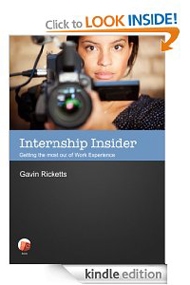I’ve just read this article about the unstoppable rise of the internship on the BBC website. Lots of good points raised, especially about how the system is disadvantageous to those from less affluent backgrounds who can’t afford to work for free. However, when I look back on leaving University, I really wasn’t ready to walk into a job. I had taken an arts subject, and had no real experience of working in an office, in terms of how to behave or how office life is structured. I took an internship which turned into nearly 6 months unpaid work. Yes, it was exciting, I was given more responsibility at a higher level, but in retrospect, the internship stopped me looking for proper paid work. And the way that one company operated wasn’t necessarily the best way to work. So here’s my internship advice to get the most out of your experience.
Internship Advice
1) An ideal internship is 2-3 weeks. First week you’re getting to grips with how that place works. Second week, you’re learning stuff. If they want you for a third week, you’ve reached your peak of what you can learn in terms of general practice, how that particular company operates. Unless they’re about to do something completely different in the fourth/fifth weeks ie they’re going to spend a week filming in the studio after 3 weeks prep, you’re better off moving on and doing an internship with another company, and learning new ways of working. If they still want you around by weeks 6 and 7 then really, you’re good enough to get paid.
2) Make sure your time is flexible there. You don’t want to be turning down interviews or a day’s paid work because you’re doing an internship. You don’t want to appear flakey by turning up at a different time every day, but heading off to another interview might make them take notice and snap you up. In fact, I knew one production assistant who was working for free, and I had a short project I could offer her paid. She thought it over, and then plucked up the courage to ask her bosses if she could leave the internship for the three weeks of the project. They said no, and started paying her instead. She’s now a Production Manager at that company. Seeming in demand in her case, tipped the balance from unpaid intern to member of staff.
3) Don’t feel you have to label your internships on your CV. Sure, if it’s during your studies, then it’s likely that your work experience is unpaid. However, if you’ve graduated, then don’t highlight on your CV that you were on an internship. People will presume you were paid, as there are lots of short term jobs in TV. And believe me, no employer wants to be the first person to pay you for doing the work. They all want to see that someone else has felt you good enough to part with money for your services before they do. If you get to the interview stage, then be clear about it if asked, but at least you’ve then got the chance to speak to them about your experience in person.
4) When you start, ask who your mentor will be, ie who should you turn to for advice. If you identify a specific person, then you’ll feel more comfortable asking them how to do things.
5) Spent the whole week logging shots? Some internships are frankly nothing more than unpaid labour. Don’t get stuck logging clips for two weeks. Politely say that you’ve come here for work experience, and in the time your here will there be opportunities to do other tasks? An internship shouldn’t be an endurance test.
6) Read The Rules of Work by Richard Templar. It’ll be the best £7 you’ve ever spent on your career. The book is packed with great tips and insight into working life. It’s like 6 months of proper working experience to fast forward your understanding of office politics and how to behave.
 More Internship Advice
More Internship Advice
For more tips on applying for Internships and getting the most from the experience, see our Internship Insider Report.

